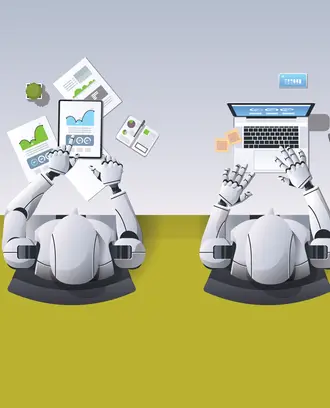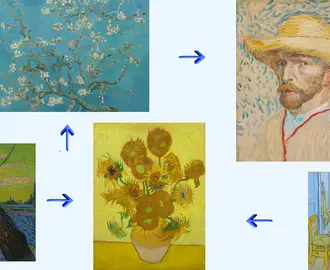Research
Study demonstrates the value of ‘long ties’
Maintaining relationships with distant contacts takes work but results in a more diverse network and increased access to economic opportunities.
It’s often said that economic advancement comes down to who you know. That might include relatively distant connections.
A recent paper co-authored by MIT Sloan professor and Eaman Jahani, PhD ’21, details a correlation they found between evidence of economic well-being and a greater number of long ties — people whom you know but with whom you share no other mutual connections. Examples include a childhood neighbor now living 1,000 miles away, a former colleague now working in another industry, or a college roommate you talk to about basketball.
By examining public interactions among all Facebook users in the U.S. in a six-month period, the researchers found that people who choose to move out of state, or who transfer to another school due to circumstances beyond their control, tend to have more long ties and are more likely to be better off financially as a result. Maintaining relationships with long ties takes work, but it results in a more diverse network and increased access to economic opportunities.
Samuel Fraiberger, a data scientist with the World Bank’s Development Data Group, and Michael Bailey, an economist who works at Meta, are also co-authors of the paper.
“We might think our closest relationships help us the most, but they’re often embedded in a lot of other relationships. That makes them, in some sense, redundant,” Eckles said. “If a close friend has valuable information, it’s likely the same valuable information that a lot of mutual friends have as well. On the other hand, long ties give you access to information and opportunities you wouldn’t have otherwise.”
Ties for all occasions
Sociologists, economists, and management professionals have explored various types of interpersonal relationships for decades.
“The Sociology of Georg Simmel,” a book first published in the U.S. in 1950, described how individuals with long ties are well suited to serve as mediators because they provide a unique link between two communities. (This may be the case if, for example, only one person working for company is also an active member of the community garden.)
In 1973, Mark Granovetter — who edited the new paper about long ties — researched the strength of weak ties. He found that individuals someone knows peripherally and engages with occasionally are more likely to introduce them to previously unknown opportunities than the strong ties they know quite well. A 2010 paper further pointed to the value of dormant ties — previously strong ties with whom someone has lost touch but who could offer support upon reconnecting.
According to a study of Facebook data, those moving from one state to another had 13% more long ties than those who didn’t move.
More recently, MIT Sloan professor and others found that weak ties can make a difference in job searches, leading to more job applications and greater job mobility. Meanwhile, MIT Sloan professor Alex “Sandy” Pentland found that long ties are more persistent than short ties, in part because short ties can be indirectly maintained by interacting with mutual connections, whereas people have to put more direct effort into maintaining long ties. (In other words, if someone hosting a barbecue believes that a friend will let another, mutual friend know about the event, the host might not feel the need to contact that third individual.)
While weak ties generally tend to be long ties, long ties can also be strong ties. Those are the connections that matter the most, Eckles said. “It’s not just about having long ties. Having long ties you interact with more is advantageous. It’s about the strength of your ties, not just the structure of your network.”
Long ties and signs of prosperity
The researchers looked at how individuals maintained ties with Facebook friends amid three common disruptive events: transferring to a different high school, attending college outside one’s home state, or otherwise moving out of their home state.
The study was based on comments posted by users residing in the United States from December 2020 to June 2021. Access to Facebook data allowed researchers to look at users’ self-reported information both in aggregate and at scale. For example, researchers were able to compare ties for 16.7 million users who still lived in their home state against those for 3.9 million users who had left their home state before 2012 but hadn’t moved since.
All three types of disruptive events were associated with a greater number of long ties. In particular, those who had moved from one state to another had 13% more long ties than those who hadn’t moved, and those who had changed high schools had 10% more long ties than those who had attended a single high school.
“Maybe you hated moving around or changing high schools, but that might have also helped you build a more structurally diverse social network and develop the skills to juggle being part of multiple communities,” Eckles said.
Comparing Facebook users’ long ties to data on economic indicators from the American Community Survey, researchers found that a greater number of long ties is associated with four indicators of socioeconomic well-being: living in higher-income ZIP codes, having more internet-connected devices, having more expensive phones, and donating more often to charitable campaigns.
Building ties without disruption
Maintaining long ties is challenging. Close-knit local groups of friends may attend the same gathering, but a faraway childhood friend or former colleague likely won’t. Being in touch with them requires more effort.
“It’s cognitively difficult,” said Jahani, now a postdoctoral associate at the University of California, Berkeley. “A connection may be in a different state or a different industry, or they may speak a different language. It takes a certain type of social skill to maintain these ties.”
People who go through disruptive events tend to have little choice but to build such skills, he added. “In a normal situation, you have a backup option. With disruptive events, there’s no alternative. You have to deal with it — and the skills you develop pay off later.”
How can people cultivate long ties without disruption? This is an important question, given the link between social networks and inequity. Additional research has shown that upward mobility is strongly tied to where people live and that non-white, lower-income individuals tend to have smaller support networks. As Eckles pointed out, it could be that long and strong ties lead to better economic outcomes — or it could be that higher-income individuals have different network structures that make it easier to maintain long ties.
“How can we codify these social skills for people with limited mobility and limited access to opportunity?” Jahani asked. Government policies such as desegregation can help, as can corporate initiatives to form multidisciplinary teams, but those efforts succeed only if individuals have incentives to maintain the ties they form, he added.
“Demographic diversity in interpersonal relationships can be important for the same reasons long ties are important. Each one can be a portal into a different social world,” said MIT Sloan professor and associate dean for diversity, equity, and inclusion “When we hear about network-based benefits, like the benefits provided by long ties, we tend to think acquiring those benefits requires that we somehow become less genuine and more strategic. This naturally makes many of us uncomfortable.”
Yet, realizing the benefits of social relationships requires only a slight change in orientation. “You can be strategic in how you allocate your time and attention across different settings and be genuine with the people you meet,” Reagans said. “Target events that bring you into contact with new people. Ask how you can help. Relationships emerge from a natural process of give and take.”
Read next: Weak ties make a difference in finding a job online




